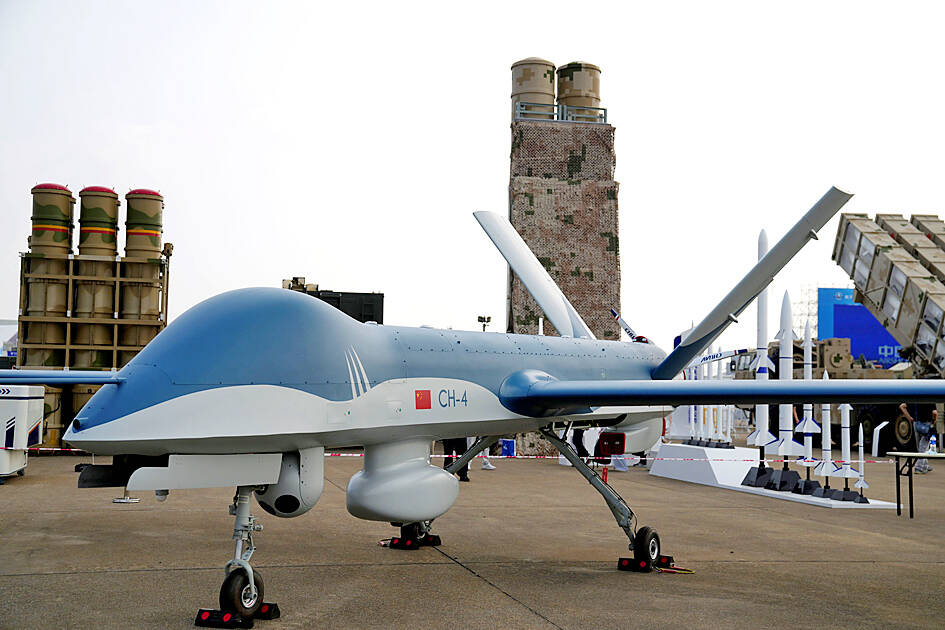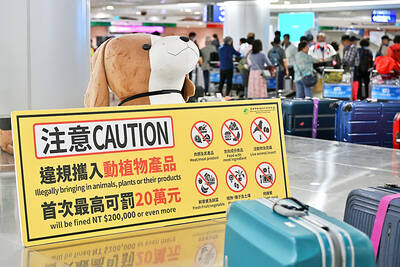Taiwan must develop ways to counter the rising threat posed by Chinese drones, the Institute for National Defense and Security Research wrote in a report commissioned by the Mainland Affairs Council.
The Chinese Communist Party (CCP) has increasingly used drones in the past few years to carry out “gray zone” operations in the airspace around Taiwan, and over the Taiwan Strait, the East China Sea and South China Sea, the report said.
Taiwan must develop measures to counter the drones, review whether existing weapons and equipment can be used to that end, and develop technologies, equipment and tactics that specifically deal with uncrewed aerial vehicles (UAVs).

Photo: Reuters
The military should also enhance and expand its use of drones, and develop advanced drone technology to bolster asymmetric combat capabilities, it wrote.
The Chinese UAVs that have been spotted in the region over the past few years include the CH-4 mixed attack and reconnaissance drone; the Harbin BZK-005 high-altitude, long-range drone; the Tengden TB-001 medium-altitude, long-endurance drone; the KVD-001 tactical drone; the BZK-007 reconnaissance drone; and the Wing Loong-10 high-altitude, long-endurance drone.
The latter three first appeared in the past year, the report said.
The Wing Loong-10 first appeared over the Taiwan Strait in April last year, flying northward, it said.
The vehicle, which uses a turbojet engine for propulsion, can be fitted with a variety of weapons systems to pinpoint targets before firing from high altitude, it said.
The BZK-007 first appeared in September last year over waters to the southeast of Taiwan, the report said.
The vehicle is equipped with a satellite antenna to perform long-term reconnaissance and surveillance tasks.
“This drone has the advantage that it is cheap to build, and it can stay in the air for up to 16 hours. It has become part of the regular arsenal of China’s air force,” the report said.
The report said that China was using the incursions into Taiwanese airspace to test its drones’ long-distance flight capabilities, satellite positioning, guidance, control and automatic route planning.
The incursions are also a way for China to test Taiwan’s and Japan’s air-defense response capabilities, it said.
However, China’s military drones are mainly tasked with patrols, surveillance, reconnaissance, target calibration, battlefield assessment, communications support, air-defense suppression and logistical support, it said.
“It is clear that the CCP will use a large number of drones in military and combat missions to support its various stages of combat operations,” the report said.
“This will mean everything from intelligence gathering and communications relay to the implementation of precision strikes and serving as decoys to consume enemy air defenses,” it said.
China might also convert older fighter jets, such as the J-6 and J-7 planes, into UAVs to serve as decoys, it said.

UKRAINE, NVIDIA: The US leader said the subject of Russia’s war had come up ‘very strongly,’ while Jenson Huang was hoping that the conversation was good Chinese President Xi Jinping (習近平) and US President Donald Trump had differing takes following their meeting in Busan, South Korea, yesterday. Xi said that the two sides should complete follow-up work as soon as possible to deliver tangible results that would provide “peace of mind” to China, the US and the rest of the world, while Trump hailed the “great success” of the talks. The two discussed trade, including a deal to reduce tariffs slapped on China for its role in the fentanyl trade, as well as cooperation in ending the war in Ukraine, among other issues, but they did not mention

Japanese Prime Minister Sanae Takaichi yesterday lavished US President Donald Trump with praise and vows of a “golden age” of ties on his visit to Tokyo, before inking a deal with Washington aimed at securing critical minerals. Takaichi — Japan’s first female prime minister — pulled out all the stops for Trump in her opening test on the international stage and even announced that she would nominate him for a Nobel Peace Prize, the White House said. Trump has become increasingly focused on the Nobel since his return to power in January and claims to have ended several conflicts around the world,

REASSURANCE: The US said Taiwan’s interests would not be harmed during the talk and that it remains steadfast in its support for the nation, the foreign minister said US President Donald Trump on Friday said he would bring up Taiwan with Chinese President Xi Jinping (習近平) during a meeting on the sidelines of the APEC Summit in South Korea this week. “I will be talking about Taiwan [with Xi],” Trump told reporters before he departed for his trip to Asia, adding that he had “a lot of respect for Taiwan.” “We have a lot to talk about with President Xi, and he has a lot to talk about with us. I think we’ll have a good meeting,” Trump said. Taiwan has long been a contentious issue between the US and China.

Taiwan’s first African swine fever (ASF) case has been confirmed and would soon be reported to the World Organization for Animal Health (WOAH), Minister of Agriculture Chen Junne-jih (陳駿季) yesterday. The Ministry of Agriculture’s Veterinary Research Institute yesterday completed the analysis of samples collected on Tuesday from dead pigs at a hog farm in Taichung and found they were ASF-positive. Animal and Plant Health Inspection Agency Animal Quarantine Division chief Lin Nien-nung (林念農) said the result would be reported to the WOAH and Taiwan’s major trade partners would also be notified, adding that pork exports would be suspended. As of Friday, all samples